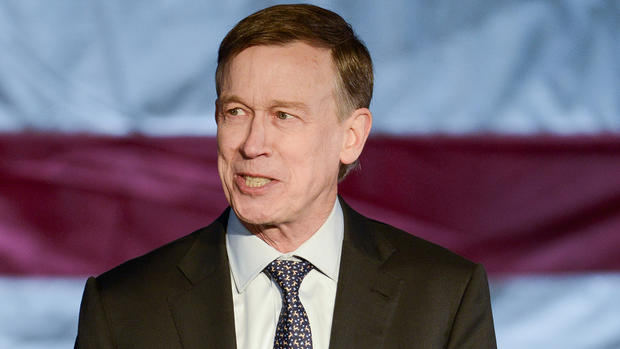Hickenlooper: 'The Green New Deal Sets Us Up For Failure'
DENVER (CBS4) -- Former Colorado Governor John Hickenlooper is the first 2020 Democratic candidate to oppose the Green New Deal. The resolution calls for a "10-year national mobilization" on the scale of the original New Deal to shift the U.S. economy away from fossil fuels such as oil and coal and replace them with renewable sources such as wind and solar power. It calls for meeting "100 percent of the power demand in the United States through clean, renewable and zero-emission energy sources," including nuclear power.
The Senate failed to pass a procedural vote on the Green New Deal on Tuesday.
The resolution was introduced by Congresswoman Alexandria Ocasio-Cortez (D-NY) and Senator Ed Markey (D-MA) -- who called it "a mission to save all of creation."
Video: 2020 Presidential Candidate John Hickenlooper Answers Lightning Round Of Questions
On Tuesday, the Washington Post published an op-ed by Hickenlooper. Hickenlooper argued that we must act urgently on climate change, but that the Green New Deal sets unachievable goals. Hickenlooper also expressed concerns about the affordability of clear energy.
The full op-ed follows.
The Green New Deal sets us up for failure. We need a better approach.
Climate change is a defining challenge of our time, and yet we have a president who is taking us in the wrong direction. He withdrew our country from the Paris climate accords. He is expanding drilling on public lands. He is forfeiting our country's leadership, changing our national symbol from the eagle to an ostrich, burying our head in the sand in the face of this global threat.
That is why I support the concept of a Green New Deal the idea that we should launch multiple major federal initiatives to tackle climate change and reorient our economy around clean energy. The idea has been around for at least a decade and will be one of my highest priorities as president.
But given the scope of the threat of global climate change, it is also imperative we approach it correctly. Some versions of the Green New Deal, such as the resolution from Rep. Alexandria Ocasio-Cortez (D-N.Y.) and Sen. Ed Markey (D-Mass.) that the Senate is set to vote on Tuesday, express laudable aims but also take an approach that limits our prospects for success.
The resolution sets unachievable goals. We do not yet have the technology needed to reach "net-zero greenhouse gas emissions" in 10 years. That's why many wind and solar companies don't support it. There is no clean substitute for jet fuel. Electric vehicles are growing quickly, yet are still in their infancy. Manufacturing industries such as steel and chemicals, which account for almost as much carbon emissions as transportation, are even harder to decarbonize.
Amid this technological innovation, we need to ensure that energy is not only clean but also affordable. Millions of Americans struggle with "energy poverty." Too often, low-income Americans must choose between paying for medicine and having their heat shut off. Their situation is all the more urgent given the ongoing attempts by President Trump to cut programs such as the Low Income Home Energy Assistance Program.
In addition to technological barriers, the Ocasio-Cortez-Markey resolution sets the Green New Deal up for failure by shifting away from private decision-making and toward the public sector including multiple provisions with little connection to reducing greenhouse gas emissions. For example, the resolution seeks a job guarantee, with full benefits, for every person in the United States. That means the federal government would have to provide a job if the private sector did not. This provision, along with others, would produce a massive expansion of government that would likely be far too expensive and complex to execute effectively in the urgent time frame we are facing.
To achieve the kinds of innovations needed to tackle the climate crisis, government must not shun the private sector, but rather must work closely with industry and our nation's great research universities. Only by harnessing the ingenuity and resources of our entire society will we find solutions and scale them rapidly to meet our ambitions. The Ocasio-Cortez-Markey resolution gives government the dominant role on investment decisions, but most of the gains we have seen in recent years on renewable energy have come from entrepreneurs and companies responding to incentives from the market and the federal government, not bending to federal mandates.
Of course, I am not suggesting that industry can do it alone. My version of a Green New Deal would also involve historic federal investments and incentives in electric storage, modern transmission and science to nurture the industries that will serve as the pillars of the clean economy we need to save our planet. The federal government also must play a very active role through smart regulation and well-calibrated tax policy to shape the markets in which these firms compete.
The federal government should also build on what we have done in Colorado. In 2014, we became the first state to impose its own regulation on methane emissions, which are 25 times worse for climate change than carbon dioxide, and we did it by working with both environmentalists and industry. We implemented new standards for low-emission vehicles and expanded Colorado's renewable energy standard, doubling the goal for rural electric producers. We also built public support for unprecedented expansions of light rail and the retrofitting of buildings to save energy. At the same time, we created more than 10,000 clean-energy jobs just as we can create millions of clean-energy jobs across the country if we take the right steps.
Ocasio-Cortez and others have succeeded in galvanizing the country around climate change as never before. Now that we have this public support, it is imperative that we don't abuse it. If climate change policy becomes synonymous in the U.S. psyche with higher utility bills, rising taxes and lost jobs, we will have missed our shot and we might not get another one before it's too late. Just as we responded to the crisis of polio and the space race, we need to bring the private and public sector together to save the planet.
(© Copyright 2019 CBS Broadcasting Inc. All Rights Reserved. The Associated Press contributed to this report.)




